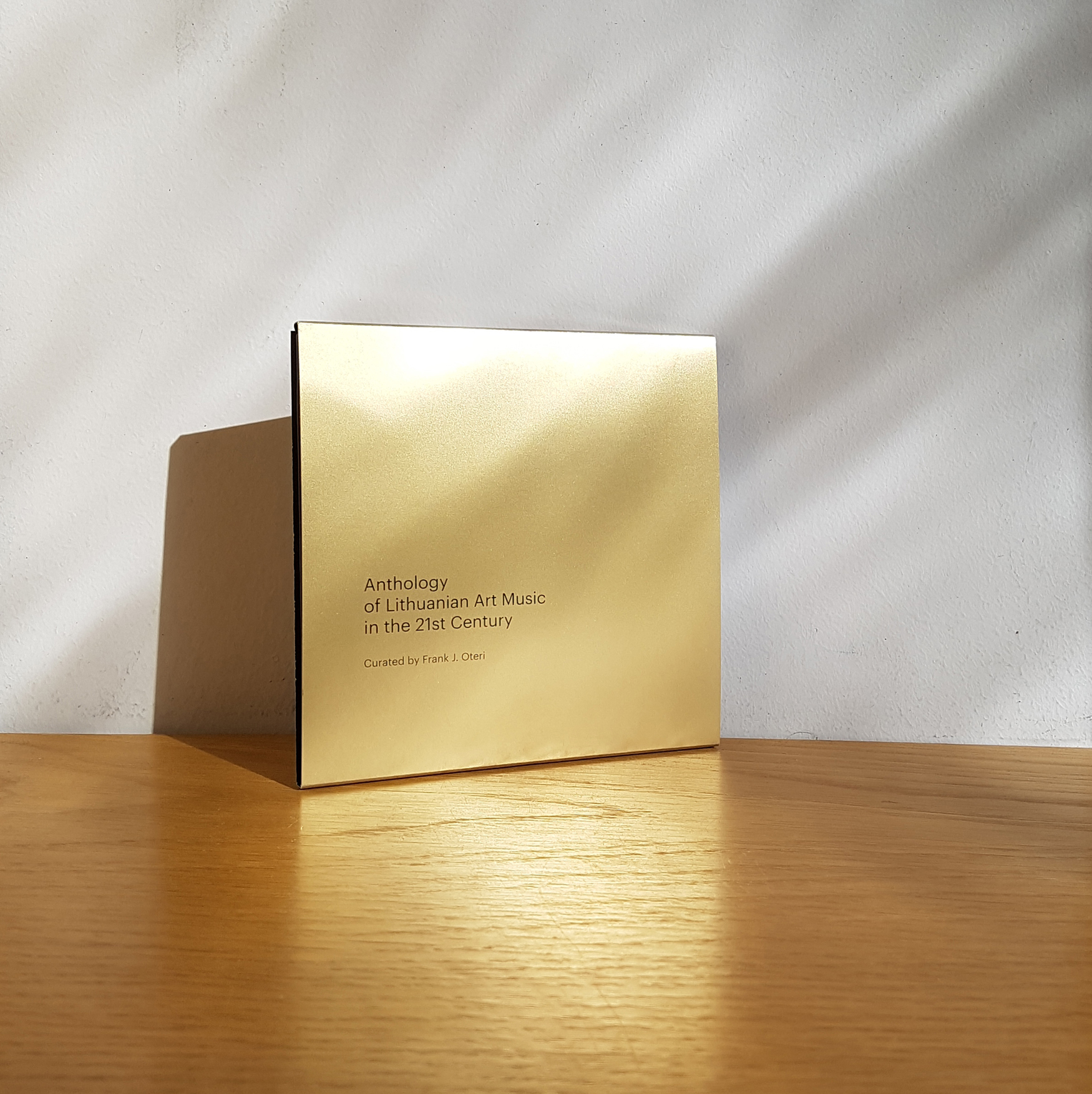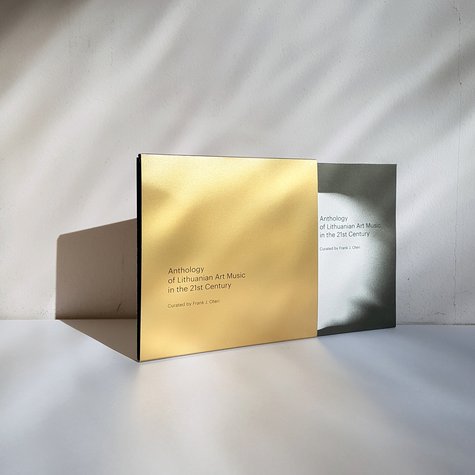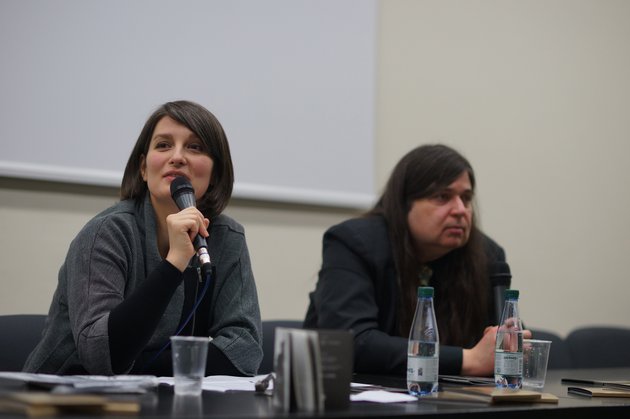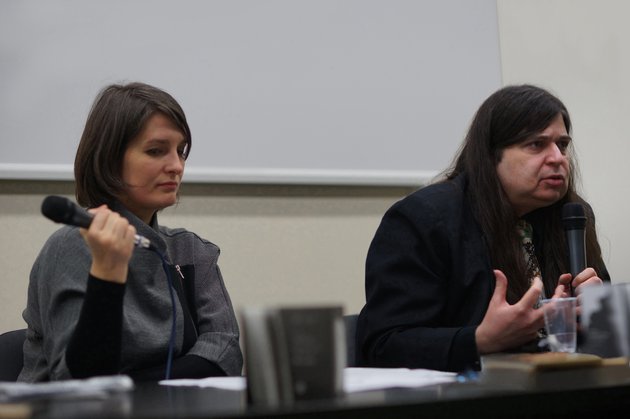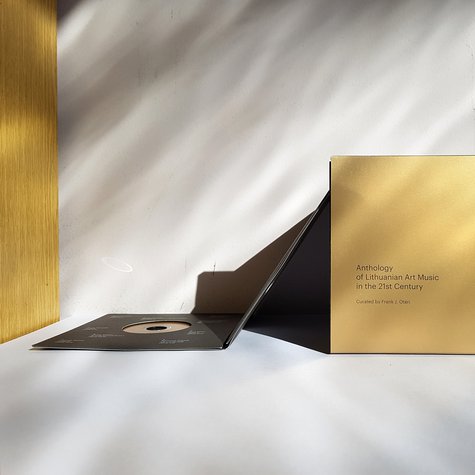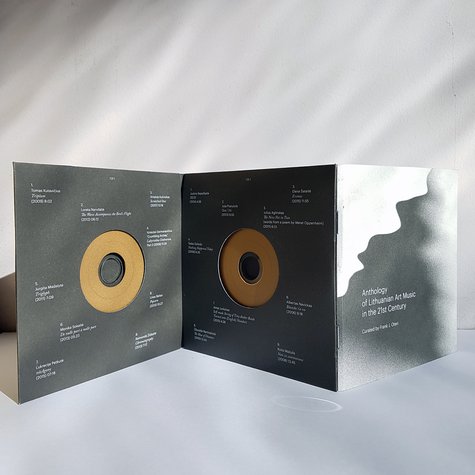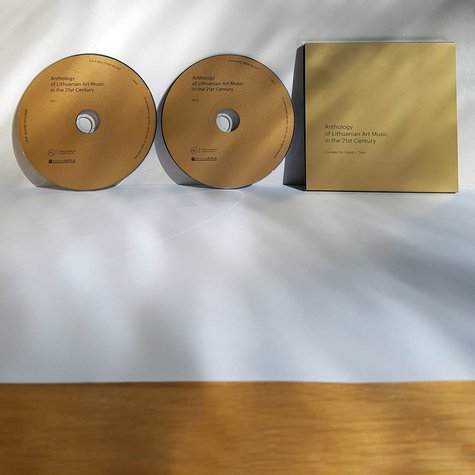Frank J. Oteri presents the Anthology of Lithuanian Art Music in the 21st Century: Every member of society can create music
- March 23, 2017
The Music Information Centre Lithuania (MICL) invited the American music journalist, composer and music lover Frank J. Oteri to visit the 2017 Vilnius Book Fair. Together with the MICL's director Asta Pakarklytė and the musicologist Veronika Janatjeva, he presented the Anthology of Lithuanian Art Music in the 21st Century which he curated. This is Oteri’s third visit to Lithuania, and he has been very interested in Lithuanian music for the last 15 years. Not only is Oteri a passionate collecter of contemporary music, whose home collection reaches over 30,000 recordings; he co-edits NewMusicBox, the web magazine from New Music USA, a non-profit American new music service organization, where he also holds the position of Composer Advocate. While working on the anthology, which was initiated by the MICL, he took on the task of listening to around 300 musical compositions written by various Lithuanian composers in the 21st century (96 altogether). Asta Pakarklytė stated that the MICL had a clear vision to release a rather different publication: one that was alternative and unexpected, and it is no wonder that the names included in this edition are atypical and very different from the ones a local musicologist would have picked.
The conversation between Veronika Janatjeva and Frank J. Oteri introducing the Anthology of Lithuanian Art Music in the 21st Century reveals the curator’s ideas and criteria, and his personal approach to contemporary music in general.
Veronika Janatjeva: Since 2002, the MICL has published the selection of music by Lithuanian composers Zoom In, which aims to promote Lithuanian music, and is available for free. The edition is distributed by mail and at international events overseas, and is available to visitors to the MICL from all over the world who are interested in Lithuanian music.
The new anthology, which is a sequel to this Zoom In series, presents recent Lithuanian music, and is also not for sale. Perhaps the MICL will continue with more issues inviting curators from overseas.
It has been 15 years since Frank’s first visit to the Gaida festival. Not long after that, in 2005, Lithuania was honoured to host the world premiere of his performance oratorio MACHUNAS. In other words, Frank’s relationship with Lithuanian artists and Lithuanian music has a long history, so it was no coincidence that he was chosen as curator for this anthology.
Today’s conversation corresponds with the theme of the 2017 Vilnius Book Fair: ‘Lithuanian Signs Visible Abroad’. As long as I can remember, Frank was always the contact that you could rely on when it came to spreading the word effectively in America. Frank’s choices were like a cold shower to MICL members, for in the constant insider discussion in relation to who has not been noticed yet and whose music should be published this year, who has been the most active and the most exceptional, one loses one's sensitivity, and it is hard to remain impartial. Frank was the person who was best able to take a fresh look.
We will talk about how you chose the pieces for this anthology, and maybe you will be able to name some identifiable Lithuanian signs or traits in the music, although it has now become very cosmopolitan.
Let’s start with the time span: the 21st century. You wrote a very exhaustive introduction, with a paragraph about what the 21st century is: has it started already, or are we still living in the 20th century in the first two decades of the 21st century? So what is your impression, and what is, in your opinion, the Zeitgeist of these two decades?
Frank J. Oteri: Well the whole point of my argument is that it’s not really possible to make judgments about the 21st century. This is the year 2017, and we’re only 17 years into the century and the millennium. So if someone says, “Ah! This is what the 21st century is!”—I don’t really believe it, because it’s too soon to have an impression. And in the essay, I talked about thinking back to the 18th century, the 19th century, and the 20th century. If you judge the 19th century by the first 17 years, the most important composer was Muzio Clementi. If you judge the 20th century by the early years, the most important composers are Puccini and Rachmaninov. I was very resistant to choose some things and not to choose other things, to say, “This is good, this is not as good.” I don’t believe in making value judgements. So to say “This is part of the 21st century’s Zeitgeist” was not my intention. Tons of music was put before me, so much music. The MICL sent out a call to all composers to submit things to be considered for the project, and more than 90 different composers responded and sent in their music—scores and recordings. I listened to maybe 300 pieces of music to come up with the 18 here. So to say, “Oh, these are the best pieces!” is not true. There is no way to know, and in fact, those 300 pieces are not the only ones; there are many more. But these were 18 pieces that were, I think, pretty exciting. Hopefully, there will be people around the world who decide, “Oh, there are interesting things hapenning there now in Lithuania.”
We talked the other day about the cult of best pieces, and you said that you are actually averse to this cult. What is your attitude towards the democratic tendencies of selection?I do tend to think that democratic tendencies are better than fascistic ones (laughing). I think that, inevitably, since music exists in time, and there are only 24 hours in a day, seven days in a week, 365 days in a year, and if we’re lucky we might live to be 90 years old, you can only listen to so many pieces of music. So there is a limit. But I hate limits. I wish I could listen to everything all the time, and I wish that other people could have access to this wide range of music. So when somebody says, “Ah! This is the best,” that, to me, is very suspicious. It doesn’t tell me necessarily that this music is the best. It tells me something about the person who has that opinion. I say, “I know what that person likes.” Since it is impossible to hear everything, because we do not live forever, and there are only 24 hours in a day, you can only maybe listen to, say ... I sleep six hours a day, so I have 18 hours, and I can’t spend all the time listening to music, so I have, on a good day, nine hours to listen to music. That’s not a lot of time. So you have to make choices.
So when we talk about festivals and choosing works, I hope that it gives an opportunity. I always want to see different people and hear different people. There are so many different composers out there from all around the world, and if lots of people get opportunities and it’s always changing and it’s democratic, I think that’s a very good thing. If it’s the same people over and over again, I think that’s kind of boring. Everyone is talking about how great Beethoven’s symphonies are. And there’s no denying they are, but there are lots of other great things, too. So to always present the same thing … Even when we talk about contemporary music, maybe there are certain composers in certain countries who get named as the great composer of the Netherlands, or the great composer from Finland ... You name the country, and we have one person. That’s ridiculous! Every country has hundreds of composers. Men, women … people who are 18 years old, people who are 85 years old. There’s a wide range. When you go outside the door, you see how many people there exist, thousands of people; that’s amazing! If only we could get all of them interested in music and in composition—interested in this idea that you can communicate ideas through writing notes on paper, and that this is an exciting thing! Most people don’t realise that. I think if they were to see that a composer isn’t some dead old man from Germany or France or Italy, and that composer could be a young woman, a young man, an older woman, an older man, somebody who lives next door to you, somebody who is sitting on the bus with you, that’s great. That’s what it’s about.Frank, I generally agree with you, but it works for people who know music and listen to it every day or at least every other day. But when you come from another field, from another country, you want to start somewhere in order to explore that field. Of course, it’s a question of supply, how many names are supplied to the market, so to speak.
I’m not sure about that. I think if you just let people know how much there is ... Because if you say there are 20 composers … and they are all dead men and white—and, yes, it’s great music, there’s no denying it’s great music—but if you tell people it’s the only music there is, somebody from another field might think, “It’s not for me. How does that relate to my life?” I grew up in New York City in the 1970s. When I was a teenager, I had no interest in classical music, it did not mean anything to me. Because I did not get told that there were other composers who lived in my city, who were connected to me. I thought they were all from some other place, they spoke some other language, they were all dead … That wasn’t interesting! Now I love that music, but it’s because I was able to interact with people and meet people who were creating music and were alive, and I thought to myself, “This is something I could do, too!” The people who are from a different field, maybe some of them, we don’t know, could be fantastic composers themselves if they had the opportunity, if they were given that chance. So I think if you open it up for everyone, I think it’s better.
But still it’s not about opportunities, it’s more about how to describe the important works to listen to. And actually, you had to limit yourself to 18 pieces to make those two discs.
Well I’ll tell you, originally it was going to be one CD, and I said, “It’s not possible! You have to do more,” and I said, maybe three, ah, two. And these are not necesserily the 18 best. There is no best. They’re fantastic, they’re really cool pieces. But there are so many cool pieces, and these are pieces that I think work together nicely, so that was part of the idea. So there were lots of things that went into determining what was selected, but it was not necessarily about selecting “the best.”
So let’s talk about criteria. I had an impression, and it struck me, actually, that the criteria could perhaps be described as equal opportunities, diversity and non-discrimination.
Yes.
In terms of gender, age, style and instrumentation: four parameters.
They are all Lithuanian though. That was the rule (laughing).
And it’s all 21st century. And all music that is notated in scores. And that is something actually I’d love to talk about. I’m a huge, huge listener of jazz, a huge listener of indie-rock, a huge listener of world music. I listen to all this stuff, country music, hip-hop, musical theatre, film music. I love all of them. It’s all interesting. I don’t say, “Oh this comes from here, I’m not interested.” No, it’s all interesting. But the idea was that this was going to be a sound postcard to the world from Lithuania. Sharing this music, and I thought, “Okay. In New York City, we do not have a Lithuanian restaurant. So there is no way to eat Lithuanian food, unless you have a Lithuanian cookbook and then you can make the recipe at home.” And that to me was what scores are for music. So if people are excited about this music, if they are musicians or presenters, these recordings come with PDF files of the scores. So you can actually see the music, and if you are excited, you can contact the Music Information Centre Lithuania and purchase parts, and pieces can be performed. That way, if there is a group in, say, South Korea, or maybe there is a group in Tajikistan, they hear this music and say, “Wow! This is great! I want to do this crazy piece for ten accordions!” [Chromatography by Raimonda Žiūkaitė]. Maybe they don’t have that many accordions in Tajikistan …
I love that piece.
I totally love it. They can get the music and do it. They don’t have to bring the musicians in and pay ten different people. Whereas if you choose a jazz ensemble or a rock band, you have to bring them. They are their music. But this notated music exists beyond the person who plays it. So that was one criterion that we had for this project. But that is not to say that there are no amazing things going on in other kinds of genres of music in Lithuania. There’s tons of great stuff! But since we only have two CDs, we had to limit it some way.
And in terms of gender, for example, it’s nine to nine …
That was very easy. That was the easiest thing, because there are so many significant women as well as men writing, and it’s pretty even in Lithuania. And that was the message I wanted to share with the rest of the world. Because in the rest of the world, it is not that way. It is not that way in France, it is not that way in Germany, it is not that way in Austria or Slovenia. In the USA, we have a very interesting situation. There are many female composers who are quite active, but there is still this kind of division, where it’s unusual in the minds of some people; and you can have a concert, it’s shocking to me, a concert of contemporary music with eight pieces of music, and every piece of music is by a guy. I go to these concerts, and I think afterwards, it’s great music, but where are all the women? I don’t say, “Oh, this is bad. Women would do it better.” It’s not about good or bad. It’s about if you are creating a concert, creating a programme, and you want to reflect the society, you have to represent everybody. I think Lithuania does a very good job at it in terms of how many people are pursuing careers as composers. It seems pretty balanced. In the USA, there are also many female composers, but maybe their music is not done as frequently. It’s very shocking. The Metropolitan Opera in New York City, the world’s most famous opera house, has just done performances of L'Amour de Loin by the Finnish composer Kaija Saariaho. This was the first time ever in my lifetime that the Metropolitan Opera did an opera by a female composer; and in fact, it was only the second time in the entire history of the Metropolitan Opera that there was an opera by a female performed. The other time was very early in the 20th-century they did Der Wald by the British composer Ethel Smythand. It was a one-act opera; it wasn’t even a full evening piece. So this is shocking.
Despite the fact that you’re saying that the American music world is rather conservative, at the beginning of the 1990s you had a separate section of music written by gay composers, and they released their own collections as gay composers.
Well, that was a very interesting project. This was the idea of Jody Dalton, a very brilliant music journalist, who at the time was running the record label CRI (Composers Recordings, Inc.). He is also very politically active, and is an outspoken advocate for gay rights and gay identity. He wanted to show that there were many composers who were gay, so he put together this anthology of gay American composers, and it was actually quite controversial 30 years ago. They later did a volume No 2 as well as a disc of lesbian composers, and they are really nice anthologies. A lot of people do not make that association, and it was also a marketing idea. It’s quite interesting: those CDs initially sold quite well, because they were not only sold in record shops. They were embraced by the gay community and sold in other kinds of shops in the Castro area in San Francisco and anywhere where there was a gay community, because of this question of identity, “Ah! That composer is like me. That composer lives in the town I live in.” Suddenly there was a way to identify. Maybe you do not come from a musical background, but if you are gay, a gay American composer is suddenly a connection for you. I think it worked.
There’s no such emphasis in this anthology, actually.
Nobody told me, and I didn’t ask. There was no question in the questionnaire “What is your sexual orientation” I hope that there is a range [of people with different sexual orientations]. It’s more than just about marketing, it‘s about reflecting society.
I think Lithuanians are still a minority.
The idea is to represent everyone, to show that everybody in society can create music.
Let’s move on to the next parameter: age. 1961, that’s Mažulis, the oldest patriarch. And the youngest, Raimonda Žiūkaitė, born in 1991. It’s a sensitive question. How did you decide whom to pick from the older composers? You mentioned Anatolijus Šenderovas, Mindaugas Urbaitis, Šarūnas Nakas, Vaclovas Augustinas, Jonas Tamulionis, Remigijus Merkelys, Arvydas Malcys, and others.
Yes, and I am a huge fan of Onutė Narbutaitė and Bronius Kutavičius; neither of them are in this anthology. It was also a question of time limits. I didn't want to have only very short pieces, only those five to thirteen minutes long, because I wanted it to be an opportunity for you to hear people in a more expansive form. But we did not want to have pieces that were longer than 15 minutes, which meant we could not have a symphony of 20 minutes, because if we had a symphony, and all the pieces were that length, we might have only had six pieces, which is not enough for an anthology. Some composers older than Mažulis were not included, because the works they've completed in the 21st century were too long, even though they're very exciting. I also thought they were well represented in previous anthologies of 20th-century music. It was very important for me that people whose work was chosen for this were people who really would have developed their voice in the 21st century. So that’s why, even though Mažulis is the oldest, he’s not all that old, just a few years older than I am; I don’t think I’m that old. You could be 90 years old and create the most amazing new piece of music now. We have this composer Elliott Carter who lived from 1908 to 2012, and he was still writing music at the age of 100 and it was amazing stuff! At the age of 98, he wrote this string orchestra piece that is so unlike any of his other stuff; it‘s a different style. If I were to do an anthology of America music in the 21st century, I would include that (but it's also only four minutes long). So I do feel bad that some of the older composers weren’t included, but there were time limits. I also wanted it to be that what was featured in this anthology were pieces of music you could not really get anywhere else. Maybe it is something that is also available on a limited edition recording that exists here, but it’s not something you can get internationally. That was an important criterion.
Can you tell the age of a composer by hearing their music?
You can’t tell the age, you cannot tell the gender, and, obviously, you cannot tell the sexual orientation.
So it’s a conceptual theme actually?It’s more like finding a balance between generations and genders. Also between instrumentations: the idea was that all the pieces should be for different kinds of ensembles, so that you could hear all the different kinds of combinations.
Including music for kanklės [a Lithuanian folk string instrument that is plucked] and choral compositions. I was excited that we have kanklės in this collection. Was that a marker to include those pieces?
I mentioned South Korea and Tajikistan. Maybe it’s very hard to find kanklės in South Korea, and I thought a lot about this. I wanted to make sure that these pieces could travel internationally. Since there are versions of instruments like the kanklės (the kantele in Finland, and it is also sort of distantly related to the cymbalom in Hungary, or maybe even to the dulcimer that we have in the US), I thought that maybe some group could do the piece using a similar musical instrument, or maybe they could transcribe the part for electric guitar. It would work. So I wanted to have that flavour of the instrument, but I also did not want it to be a barrier to somebody performing that piece of music where they don’t have that tradition of playing it.
And with choral music, this is actually a very big issue: here we have this anthology of Lithuanian music, and there is not a single piece that is sung in the Lithuanian language. I don’t speak Lithuanian, but it was not a prejudice on my part. There were actually pieces I was thinking of choosing, but they were too long. There was one 20-minute piece in the Lithuanian language I thought about. But then it dawned on me: do we want this music to travel to other parts of the world? There is a piece that has English text Nothing happened today [by Tadas Dailyda], the text is only these three words. Very easy! Even if you don’t speak English, even if you are in South Korea, you can always learn the words and do it with no problem. But if it’s in the Lithuanian language, maybe people might think, “Ah, I don’t understand this,” and they won’t do it. There’s another piece [by Jonas Jurkūnas] that's just reciting numbers: two two two three three four. Easy! Anybody can sing this. And then there’s a piece by Žibuoklė Martinaitytė that uses only syllables; it’s not in a language, so if you have phonetics you can just do it. So that was something I thought is universal and can travel without linguistic problems.
We have to give credit to Lithuanian performers who are unique in some cases (for example, in accordion music), in their excellent playing techniques. Do we have an advantage that maybe cannot be repeated elsewhere?
Well, I will tell you as an American composer, the best week of my entire life as a composer was here eleven and a half years ago when Donatas Katkus conducted MACHUNAS, this giant crazy impractical piece, at the Contemporary Art Centre in Vilnius during the St Christopher Summer Music Festival. There was such a high level of commitment that I got from the singers and from the instrumentalists … I write crazy music, I think it could have a popular appeal to listeners, but to play it can be pretty tricky … They did it, and they did real justice to it. I was very lucky. I don’t know if I could get that level of commitment, not just in terms of quality. There are great musicians all over the world, in the USA, in South Korea, in Lithuania, in Argentina, everywhere, there are plenty of good musicians. But I think there is something very special here about the commitment to making something happen. People here are not always looking at the clock and thinking, “Oh, we’re five minutes late. I have to go.” For a new piece of music, it is very hard if you are forced to work on the clock. I understand people have schedules, people have lives, and they need to be paid for the time that they’re putting into their work, but so many times I’ve heard everywhere in the world a performance that has not had enough rehearsals. The musicians are great, if only they had one more hour to rehearse it, but there was no time, and it does not do justice to the music. I think the level of commitment that the musicians showed here was rather exceptional.
Thank you so much! And thanks for providing every piece of music with a very comprehensive program note, which will help listeners and target audiences.
Ideally, I think this is something that will appeal to multiple audiences. Maybe you don’t have any background in music, and you just have a curiosity for something unfamiliar, there could be something in there for you. But also, if you are a musician, if you sing, if you play an instrument, if you conduct, maybe there’s a piece that excites you, and you’ll perform it, and that way it could reach even more audiences. That is the goal. But it was designed to be for everybody.[A question from the audience] I am from a totally different field. What in your opinion does it mean for the composers to be included in these two CDs?
Certainly to be included in something that is distributed worldwide is an opportunity. Many of the composers in this collection haven’t been widely recorded yet in Lithuania, so hopefully this will be an opportunity for them internationally, and maybe it will lead to further performances of the piece, maybe commisions for new pieces, and other opportunities; now that would be great! Broadcasts on radio, hopefully, which can get many people excited and maybe can lead to other things. I always think of music promotion as a ‘long tail’ in the economics of this music. Somebody hears something, maybe ten years later they do a performance. There is a piece of music I wrote back in 1989 that is being performed only now! Things were not happening with it years ago; now there’s a group, a duo, they just performed it in Los Angeles. Finally, that piece has a life! It takes a lot of time. It’s the same with anything: with painters, with authors, poetry, but music has an advantage. With a novel or a poem, you need to have a translator. I would love to read more Lithuanian poems and Lithuanian novels, but there’s almost nothing available in English. And again, painting is a problem, as you have to actually have the painting, so it has to travel. But a score for a piece of music can travel, and it doesn’t need to be translated, and you don’t need to pack it up and protect it the way you do with a painting; so in a way, music is easier to promote than any other art form. So hopefully, great things will happen for these composers.
[A question from the audience] You mentioned that you listen to as much music as you can, and there is so much music out there and it’s all exciting. Do you ever come back to listen to the same music? And if so, then what kind of music do you like to come back to?
This is actually a challenging question. I mentioned the nine hours. Obviously, I can only have them on the weekends when I’m home. If I’m travelling, obviously, these days when I’m here in Vilnius I’m not listening for nine hours a day. Although, thankfully, last night I got to go to two different concerts, we got to hear the a concert of music by the composer Malcys, and also went to hear Dmitrij Golovanov’s trio performing in a jazz club, so I got to hear almost two and a half hours; not nine, much less. To your question of listening again … I am an obsessive collector of recordings, so the idea is I do want to hear it again, if I didn’t want to hear it again I wouldn’t buy those CDs and LPs. I have something like 30,000 recordings in my appartment in New York, so that’s at least 30,000 hours of time. I will go back to something if I want to study it more, if I want to listen and follow the score. Or if I’m doing an interview with that composer, I will listen again and again to pieces. For the pieces that were in this anthology, for example, I had hundreds of pieces to listen to; these pieces I listened to more than once, and the pieces that were selected I listened to maybe five or six times. But it’s hard, because if I spend time listening to one thing, that means I’m not listening to something else. But it has nothing to do with style. Sometimes I listen to something, and I hate it. That makes me want to hear it again, because I question my opinion; and if I don’t like something, I don’t blame the piece. I think, maybe, there is something I’m not understanding, so I want to understand it better, so I just listen again.
